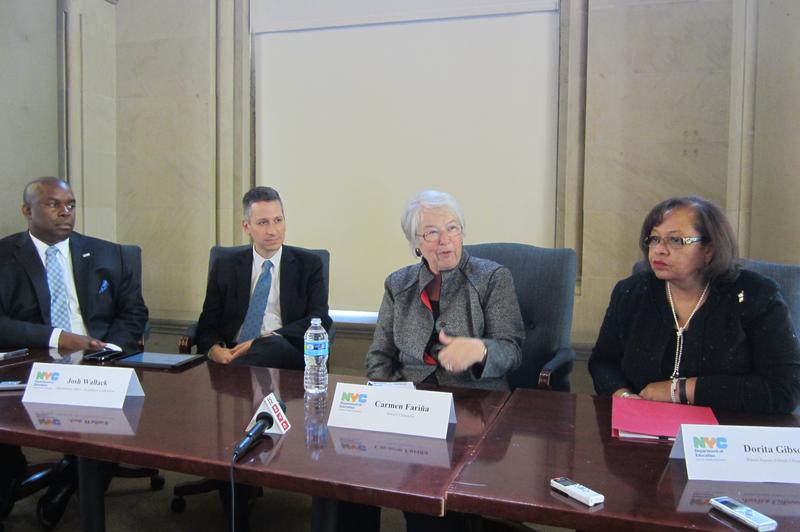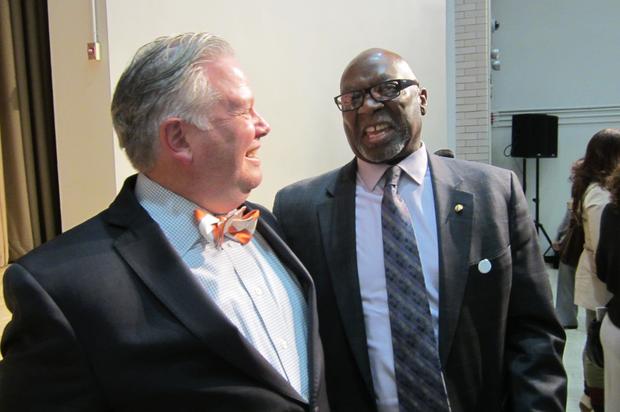
If Mayor Michael Bloomberg's administration was known for its tough love approach to failing schools, Mayor Bill de Blasio's announcement on Monday signaled a different, more nurturing tone.
De Blasio spoke at the Coalition School for Social Change, a high school in East Harlem that earned an F on its last school report card under the Bloomberg administration. Its four-year graduation rate is just 40 percent.
Yet, instead of being shut down for these low scores the school is now among 94 schools chosen for a three-year plan called "School Renewal." They will receive extra professional development, an extra period of class each day and summer school. They will also be paired with community-based organizations that can provide extra services for families along with healthcare and mental health programs.
"The previous administration had a policy that a school like this was left to fend for itself," de Blasio said of the Coalition School. "And that's why we are here today, because we reject the notion of giving up on any of our schools."
This long anticipated announcement prompted former Bloomberg appointees and supporters to defend his policies. Former Schools Chancellor Dennis Walcott said replacing failing schools with new, smaller schools was "one of the great education success stories any city has ever experienced – and it was fought tooth-and-nail by entrenched political interests."
De Blasio's critics accused the mayor of taking too long to deal with so many failing schools. Plans were due this month for 250 struggling schools, and the city requested an extension for reorganizing two extremely troubled high schools.
In their defense, de Blasio and Chancellor Carmen Fariña said it was important first to get a new contract with the teachers and to hire new superintendents who can watch over the principals.
Not surprisingly, de Blasio's plan to give the 94 schools up to three more years was met with derision by Jenny Sedlis, executive director of StudentsFirst NY.
"Adding social services to 5 percent of schools will not bring about the kind of scalable, system-wide changes parents and advocates are desperately hoping for," she said, referring to the community schools model that the mayor hopes to bring to the 94 schools.
Fariña argued the renewal plan was not soft on school leaders, and vowed to keep an eye on schools' progress.
"I cannot have anyone in any classroom that's not going to help a kid succeed," she said, adding that she's already removed six principals this year. And all the principals will get training on how to document performance so that it's easier to remove low-performing teachers.
The schools have until June to develop their improvement plans, although teachers will begin the extra training immediately. Next year, they will have to demonstrate improvements in attendance and teacher retention but they will not have to show improvements on test scores until the 2016-2017 school year.
Farina also questioned the success of Bloomberg small-schools policy, saying it neglected many children who wound up in schools that didn't get enough support.
"Everything that I'm discovering as I'm sitting in this seat are broken promises from the past," she said.
John Sullivan, the principal of the Coalition School in East Harlem, said he was among those schools that could have used more support because so many of his students are overage and lacking credits.
"I think what I heard differently today is over the course of three years we're going to be looking for increments of growth until we get to the final outcome as opposed to coming in and saying nobody here is good," he said.
The mayor and chancellor made a point of saying schools will be held accountable, a key Bloomberg-era tenet. If there is not progress, they retained the right to shut a school down, starting as early as next school year.

